
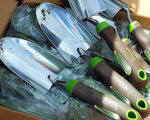
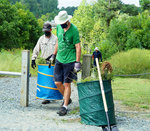
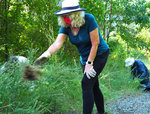


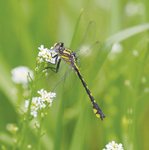
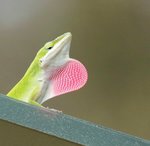
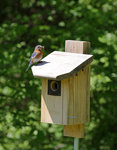
News + Record photographer Kim Hawks recently accompanied members of the Friends of Lower Haw River and members of the N.C. Wildlife Federation on a recent Friday work day at the pollinator garden near the Bynum Bridge at the Lower Haw River State Natural Area in Chatham County.
Gretchen Smith, the president of the Friends of Lower Haw River State Natural Area — in collaboration with Madison Ohmen, conservation coordinator at the Wildlife Federation — began the work day ensuring the eight volunteers had a mask and were temperature-checked. Gardening tools were on hand, and after brief overview, everyone jumped in, grabbed shovels, trowels and rakes and started pulling weeds along the path down to the Haw River.
Huge loads of invasive plants were removed in less than an hour and a half. New friends were made, existing friends were happy to see each other again and it felt great to come together to work for a higher cause in our county. While watching everyone working and not complaining on a very hot day, several names were suggested for the group: “Whack Attack Crowd,” “The Garden Guerrillas” and “Whack a Weed.” Whatever you call them, they made a huge difference in this wild space used by many hikers, canoers and kayakers. Along the way, Hawks spoke to Smith about the work Friends of Lower Haw is accomplishing.
What are the different types of parks within the N.C. State Parks system?
There are different units of the state parks system, with differences in how they balance conservation and recreation. At one end of the spectrum, you have large State Recreation Areas like Jordan Lake, Falls Lake, Fort Fisher and Kerr Lake. These recreation areas have a conservation component, but they are primarily focused on recreation.
Then, there are parks. They are a balance between recreation and conservation.
At the other end of the spectrum are State Natural Areas, where focus is more on conservation and less on recreation.
This 15-501 state natural area in Pittsboro is not considered developed, even though people have been using it for years. All the paths people walk are informal places where people hike along or put in and take out their canoes and kayaks to access the Haw River.
People may be familiar with some of the few state natural areas that are developed with trails, toilets, and picnic tables such as Occoneechee Mountain State Natural Area and Mount Jefferson State Natural Area. There are many state natural areas owned by State Parks that people may not have heard of because they are not developed so they do not get many visitors.
What are the goals of Friends of the Lower Haw?
Here in Chatham County, our population is growing and our natural areas are starting to be more heavily used. Friends of Lower Haw got a grant to develop a Lower Haw Trails Plan for this state natural area at State Parks’ request.
Before State Parks developed anything, State Parks wanted a plan. Friends of Lower Haw completed the plan in June 2018. Today, State Parks does not have staffing resources to dedicate rangers to manage this area. That’s why development hasn’t started, even though there is a plan.
Another option is to have a management agreement with Chatham County to have Chatham County manage it for them. An example of this model is Hemlock Bluffs Nature Preserve in Cary, which is owned by State Parks, and is leased to the town of Cary and the town of Cary manages it. The staff are town of Cary employees. The town of Cary put in all the trails and built the environmental education facility and environmental education pavilion. That’s a model that State Parks would like to have for this state natural area.
Since State Parks hasn’t been ready to develop their property, Friends of Lower Haw has been applying for and receiving grants to work with Chatham County Parks and Recreation to improve two of the access points that Chatham County manages. For example, this area where the pollinator garden is located is a NCDOT (Dept. of Transportation) easement, but Chatham County Parks and Recreation leases it for a county river access amenity.
What kind of improvements have Friends of the Lower Haw accomplished?
On U.S. Hwy. 64 on River Access Road, there’s a large parking lot down by the river that is owned by Chatham County Parks and Recreation. The improvements Friends of Lower Haw have accomplished are primarily in these two locations.
For example, there was one unfinished kiosk at U.S. Hwy. 15-501 with two posts, a roof and no back. Friends of Lower Haw River finished the kiosk, built another kiosk and created educational signage.
The shade shelter was in bad shape, so it was upgraded with slats on the sides to provide more shade and installed a larger roof with an overhang. Building the shade shelter and the kiosk was done by employees at Lowe’s Home Improvement in Pittsboro. Lowe’s Home Improvement has a Lowe’s Heroes program. If Lowe’s Store selects a project, they provide materials and employees to do the labor. In addition, there was not a kiosk at the Haw River access on Hwy. 64, so Lowe’s employees also built a professional shade shelter/kiosk down at the Hwy. 64 Haw River access.
The assistance by Lowe’s Hardware saved Friends of Lower Haw a lot of money in their grant. Friends of Lower Haw talked with Tracy Burnett, director of Chatham County Parks & Recreation, about additional projects they want to do. Friends of Lower Haw was fortunate to have a Boy Scout in Bynum who was looking for an Eagle Scout project.
Gretchen met with Boy Scout Ben Pickens and suggested projects, and Ben said he’d like to do them. Ben stained the kiosks, sanded and put a primer on the shade shelter. Andrea Ward, a local artist from Pittsboro, volunteered to paint the nature mural on the shade shelter. The last part of the Eagle Scout project was to create a pollinator garden in the fall of 2019. Adult volunteers prepared the site with weed trimmers, and Ben Pickens planted native pollinator seeds donated by Ernst Seeds Company. He also installed a bluebird house and two bee houses.
How did Friends of the Lower Haw and the N.C. Wildlife Federation become involved in the Pollinator Garden project?
In spring 2020 the pollinator plants sprouted. Friends of Lower Haw didn’t know what they were going to get or how the plants would perform.
Gretchen thought, “I’m not a gardener, I don’t have a green thumb, so what am I going to do?”
She knew the N.C. Wildlife Federation was involved in this type of work so she contacted them. The Federation is dedicated to protecting, conserving and restoring wildlife and habitat. They have several programs centered on supporting native plants and pollinators, including the Butterfly Highway Program.
Madison Ohmen, Conservation Coordinator at the N.C. Wildlife Federation and lead of the Butterfly Highway program, got in touch and said, “We’d love to help. We’ll help organize workdays and help recruit volunteers.”
NCWF has a large chapter network across the state with several NCWF members, donors and affiliates as well who also strive to protect, conserve and restore habitat. Madison first got involved with NCWF when her mom joined a local chapter in Concord and had Madison give a presentation on her experience as a conservation technician for the endangered butterfly, the St. Francis satyr, earlier this year.
Madison was shortly thereafter hired by NCWF as a conservation coordinator. Several chapter members from nearby joined the event to help with weeding the pollinator garden.
What else do people need to know about this work?
Gretchen would love to find a local gardening group who would like to adopt this garden and take care of it. Please share this opportunity with your gardening friends and contact Gretchen directly.
With COVID-19, people are enjoying being outdoors more than ever. Many natural outdoor spaces are overrun with people. We need more places outdoors for people to go. The few places we have are too crowded.
For more information:
Friends of Lower Haw River State Natural Park: lowerhaw.org
North Carolina Wildlife Federation: ncwf.org